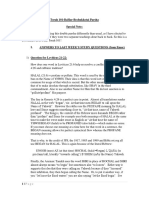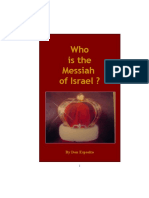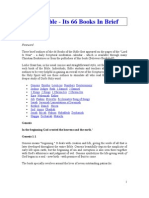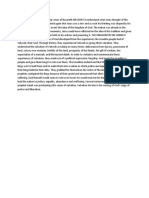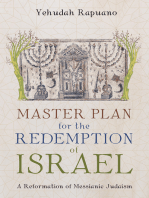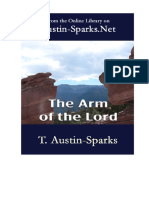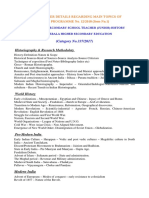Hebrew Roots
Hebrew Roots
Uploaded by
Rick PerryCopyright:
Available Formats
Hebrew Roots
Hebrew Roots
Uploaded by
Rick PerryCopyright
Available Formats
Share this document
Did you find this document useful?
Is this content inappropriate?
Copyright:
Available Formats
Hebrew Roots
Hebrew Roots
Uploaded by
Rick PerryCopyright:
Available Formats
Our Israelite Identity comes from our Hebrew Roots The Importance of Our Hebraic Roots and to fully
comprehend our Christian faith, we should know about this fascinating heritage. We study a Hebrew book-written by Hebrews; we serve a Hebrew GOD-who had Hebrew disciples; we desire to follow the first century church-which was first predominately Hebrew; and through Christ, we are grafted into a Hebrew family! It makes sense to study the Hebrew culture. This is a refreshing, new, exciting way to view the Bible! Much of the Bible is mysterious to most people. The perplexing phrases, puzzling actions, the sometimes difficult-to-understand words of Yasha {jesus}, unconventional holidays, and parables are only understood with an awareness of the Hebrew culture. A Christian's roots are deep in Israelite teaching through Christ, all the way back to Abraham! { Israelites; Jacobs name was changed to Israel. Jacob was also the father of twelve sons whom are known as the twelve tribes. Jacob was the son of Isaac who was the brother of Esau, who together where the sons of Isaac whos father was Abraham. Abraham was Hebrew, and is the one that Yahweh {GOD} blessed and told him he would be the father of many nations.} And if ye be Christ's, then are ye Abraham's seed, and heirs according to the promise (Gal. 3:29). Studying Scripture from our Western/American/Greek view is like looking for gold in a dark mine with a dim pen light--you can see enough to stumble around but you need more light to see clearly. A good grasp of the ancient Hebraic customs and terminology would allow you to reexamine Scripture in this powerful flood light, exposing intricate details and treasures. Take a look at the examples below. One is a familiar Bible story, the other a familiar Bible phrase. Examine each with a light shed from Hebraic understanding. The Woman with the Issue of Blood; The woman described in Matthew 9:20 had faith. She believed she would be healed if she did but touch the very hem of his garment. If you understand Hebrew thought you'll understand the significance of the story. Why did the woman touch the hem? The hem of a Hebrew's prayer shawl is very important. {the shawl would look something like a mans long as in dragging the ground long shower robe} The prayer shawl worn by Hebrew Priests is called a tallit. The fringe on the corner of the tallit is called a tzitzit. In Numbers 15 Yah directs the Hebrews to make fringes on the borders (also called corners or wings) of their garments to remind them of God's law! ... Speak unto the children of Israel, and bid them that they make them fringes in the borders of their garments throughout their generations, and that they put upon the fringe of the borders a ribband of blue: And it shall be unto you for a fringe, that ye may look upon it, and remember all the commandments of your Heavenly Father...(Numbers 15:38-39). There are 613 actual commandments in the Torah. The Torah is the book of the laws, or the first five books of the bible. 248 positive and 365 negative. Each tzitzit consist of five double knots and eighteen threads for a total of 13 elements. The numerical value of the word tzitzit is 600. So the total is 613. During the first century, a tradition associated with the tallit is that the tzitzit of the Messiah had healing powers. The Son of righteousness arise with healing in his wings (Mal 4:2). The woman must have known of this tradition and in faith she touched the wings of His garment showing she believed Yasha is the Messiah! Lets look at another example; The Kingdom of Heaven or Kingdom of God is the central theme of Yasha's preaching;
The Hebrews did not use the sacred name of God. Many times they used the expression Kingdom of Heaven or Kingdom of God-just as today we say, "Heaven help me." We are not asking for heaven's help. We are asking for God's help. Look at the phrase "The Kingdom of God has come near you" (Luke 10:9-11). The Kingdom of Heaven or God is described by most commentaries as God's kingdom to come sometime in the future. Some teach it means the second coming of Christ (Yasha called the second coming "the coming of the Son of Man"). The Greek word engiken means "about to appear" or "is almost here". However, if it is translated back to Hebrew-the verb karav means "to come up to," "to be where something or someone is." In the Greek the Kingdom is at a distance or yet to come. In the Hebrew-it is here! Yasha' Messiahship is present here and now. The "Kingdom of Heaven" is not futuristic, but rather a present reality wherever Yah is ruling...when one is able to put [Greek] passages back into Hebrew, it is immediately obvious that the Kingdom has already arrived, is in fact already here-almost the exact opposite of the Greek meaning (Bivin, Blizzard 1995).Yasha Himself proclaimed that the Kingdom was at hand. This proclamation involved an awakening cry of sensational and universal significance. He was referring to Himself as the King being at hand-being present. He was already present in his person, He is the King. For one to follow Him he had to make Him his King and follow His rules. Here is another example; Not every one that saith unto me, Lord, Lord, shall enter into the kingdom of heaven; but he that doeth the will of my Father which is in heaven (Matt. 7:21) takes on a whole new meaning. It is not heaven that they won't be entering. It is His Kingdom now, of peace, following His ways (Wilson 1989). Blessed are the poor in spirit: for theirs is the Kingdom of Heaven also takes on a new meaning. Reread the following verses with this new light. It may change your opinion of these teachings: Mark 4:30-32; Matt. 13:33; 18:3; Luke 13:20-21, Matt. 12:28; Luke 11:20; Luke 17:20-21. Yasha did not come right out and say, "I am the Messiah," In Hebrew there are far more powerful ways of making that claim (Bivin, Blizzard 1995). Seeking first the Kingdom of Yah is making Yasha savior of your life today! In studying our Hebrew roots several fascinating books are available explaining Hebrew thought. "Yeshua: A Guide to Jesus and the Original Church" by Ron Mosley explains misunderstood idioms in Yasha's teaching such as: binding and losing, the parable of the reed and oak, the golden vine, the good eye, and many more. "Understanding the Difficult Words of Jesus," by David Bivin and Roy Blizzard, explains that a proper Hebraic understanding of the words of Yasha would stop most theological controversies! Our Father Abraham: Jewish Roots of the Christian Faith by Dr. Marvin Wilson is a in depth, detailed look at the Hebraic thought patterns as well as a study of Hebrew culture, worship, law and every aspect of family life. Here Dr. Wilson explains the contour of Hebrew thought: Modern man in the Western world thinks he has an image to defend. He is supposed to be macho and keep his cool. He is expected to be made of steel, always in control. He does not allow himself to become vulnerable by revealing much of his emotions. It is usually considered unmanly for him to cry. Yet Yasha, the exemplary man, wept (Luke 19:41; John 11:35). This display of emotion was in sharp contrast to the Greco-Roman world of the Stoics, who sought to be indifferent to pleasure or pain; they were determined never to submit or to yield; they were resolved to overcome their emotions and desires. The Hebrews, however, were a very passionate people; they did not hide or suppress their emotions. The Hebrews, both men and women, were able to affirm their full humanity. They gave vent to their feelings, for each emotion had "a time" appropriate for its expression: being angry, crying, laughing, singing, feasting, dancing, hand clapping, shouting, embracing, and loving (see Eccl. 3:1-8).
A brief summary of the holidays described in the Bible reveals a decisive emphasis on the release of emotion, especially joy. The weekly Sabbath is a time of rejoicing as Yah is celebrated as Creator (Isaiah 58:13-14; cf. Exod. 20:8-11). The entire annual calendar of festivals shows that the Hebrews were not afraid to release their emotions, in collective historical memory, before Yah and one another. The Hebrews were hardly halfhearted or reserved in their approach to life. Digging through the layers what we now consider "The Church" is almost nothing like the Early New Testament Church. Author/speaker Richard Booker once explained this, by giving the example of an archeologist digging through layers to find out what life was like in ancient times. To understand the Early Church we must dig through layers of a mountain of man's influences shoveling off and discarding man's traditions, theories, interpretations, and philosophies from Greek and Roman civilizations, Constantine, Marcion, Catholicism, etc., to be able to examine the Early Church. During the Reformation, men such as Wycliffe and Calvin were digging in the right spot. They dug up and discarded many theological errors and found a view of God's plan of salvation by grace, but anti-Semitic layers remain and now there are new layers of tradition, interpretations, western thought (a return to the Greek and Roman thought) and conditioning that need removal. Only then can we have a clear view of the Early Church worship. Biblical Worship is Family Worship. Yah has specific ways that He wants us to serve and worship Him. Those ways are pointed out for us by Yasha and the first church. They are the old paths. Thus saith the LORD, Stand ye in the ways, and see, and ask for the old paths, where is the good way, and walk therein, and ye shall find rest for your souls... (Jer. 6:16). Unfortunately these "old paths" have been paved with man's influences, opinions, traditions and interpretations of interpretations of interpretations of interpretations... and sometimes, like the holidays, simply ignored. Christians can learn much from the Biblical Hebrew's strong family/worship lifestyle. Everything is centered around the home-family, education and worship. Every area of the Hebrew world view is entirely saturated and encompassed with God. The Hebrews make no distinction between their spiritual life and the physical areas of life. They see all of life as an entirety. It is all God's domain. Everything that happens is an opportunity to praise Him. He is in control of everything-pains and joys. Yah's Word explains this Hebrew reasoning: I have set the Lord always before me (Psalms 16:8), and in Proverbs 3:6, in all thy ways acknowledge him and he shall direct thy paths. There were times of Temple worship; however, most of the worship is centered around the home. If you were to visit an Israelites home in biblical times on a typical Friday you would find everyone in the home in a hurried state preparing for the coming Sabbath. Setting a fine table and special meal. At sundown, all the hurrying stops. The Mother of the home prays and dedicates this special day unto Yah as she lights the Sabbath candles to begin the Sabbath. The dad leads the family in prayers, scripture readings, and singing praise and worship. He prays a special blessing over each child. The rest of the twenty-four hour period is spent resting, enjoying family, growing spiritually as individuals, and growing closer together as a family. We should ask ourselves, "Is there a time, if someone entered our home, that they would see such devotion to Yah?" How ashamed we should be when we dont share with those who don't even know Yasha as the Messiah.
Professing Christians in America, in general, tend to view "The Church" as a part of their life and only a small part at that. Life and relationships are divided into groups, into three or four distinctly different locations: partly religious (a few hours a week at church), partly educational for people with kids (school), partly professional (workplace), and partly leisure / play (home). Each person in the family is going in separate directions and rarely at home together. Even in the church, the only family time spent together is on the ride to and from church. Upon arrival the family divides into their proper classes. It is hard to find all the members of a family together in one area at the same time in church, much less worshiping and interacting together or praying together as a family. By examining the holidays, we can get a taste of the almost forgotten family worship. A worship lead by dad, in our homes, teaching our children Yah's Word (Deut. 6), with our families, singing and praising Yah, learning of His ways-growing, in Him, together! Rick Perry Bible Quest Nov. 2006 Inspired by material found at; BiblicalHolidays.com
You might also like
- Mercedes CLK w208 Users ManualDocument330 pagesMercedes CLK w208 Users ManualRadi Salama67% (3)
- Affidavit of TruthDocument12 pagesAffidavit of TruthAndre Lowe96% (25)
- The Last Things - An Escathology For Laymen - George Eldon LaddDocument55 pagesThe Last Things - An Escathology For Laymen - George Eldon LaddRubem_CL100% (9)
- K Prince - The Destiny of Israel and The ChurchDocument13 pagesK Prince - The Destiny of Israel and The ChurchC@9959836560No ratings yet
- Jesus Is Not The MessiahDocument28 pagesJesus Is Not The MessiahRoberto FortuNo ratings yet
- Employee Handbook-Minneapolis Public SchoolsDocument56 pagesEmployee Handbook-Minneapolis Public Schoolsmichealj4No ratings yet
- Torah101 Bahar Bechukkotai2016Document9 pagesTorah101 Bahar Bechukkotai2016api-204785694No ratings yet
- Torah101 TzavDocument6 pagesTorah101 Tzavapi-204785694100% (1)
- Module 1 Reading - Faith Within The Hebrew-Jewish ContextDocument7 pagesModule 1 Reading - Faith Within The Hebrew-Jewish ContextjohnyvanvalenzuelaNo ratings yet
- Who Is The Messiah of IsraelDocument105 pagesWho Is The Messiah of IsraelHaSophimNo ratings yet
- The Greater Exodus Not The RaptureDocument6 pagesThe Greater Exodus Not The RaptureBlackShadowSnoopy100% (1)
- 0811 Newsletter Aug 2011Document1 page0811 Newsletter Aug 2011api-269007409No ratings yet
- Frank Holbrook - Chapter 3Document20 pagesFrank Holbrook - Chapter 3Christopher EgeNo ratings yet
- The Names and Order of The Books of The Old Testament BullingerDocument13 pagesThe Names and Order of The Books of The Old Testament BullingerFausto OrqueraNo ratings yet
- A Ruach Qadim Excerpt Paul The MysticDocument15 pagesA Ruach Qadim Excerpt Paul The MysticDaniel Constantine100% (1)
- George Eldon Ladd - Israel and The ChurchDocument4 pagesGeorge Eldon Ladd - Israel and The ChurchMick RynningNo ratings yet
- Refining and Reminding - A Devotional Study of Numbers and DeuteronomyFrom EverandRefining and Reminding - A Devotional Study of Numbers and DeuteronomyNo ratings yet
- Parashah 50 - Ki Tavo (5776)Document13 pagesParashah 50 - Ki Tavo (5776)HaSophimNo ratings yet
- Parashah 34 B'MidbarDocument11 pagesParashah 34 B'MidbarHaSophimNo ratings yet
- The Bible - Its 66 Books in Brief-By L M GrantDocument44 pagesThe Bible - Its 66 Books in Brief-By L M Grantapi-3755336No ratings yet
- Torah 101-Tzav Parsha I. Answers To Study Questions (From Vayikra)Document7 pagesTorah 101-Tzav Parsha I. Answers To Study Questions (From Vayikra)api-204785694100% (1)
- Sheep Nations: It's Time to Take the Nations!From EverandSheep Nations: It's Time to Take the Nations!Rating: 5 out of 5 stars5/5 (1)
- Easy to Understand Bible Stories of the Old Testament and Angels in ProphecyFrom EverandEasy to Understand Bible Stories of the Old Testament and Angels in ProphecyNo ratings yet
- Ancient Bible Feasts: A Telescopic View of Israel, Christ and the ChurchFrom EverandAncient Bible Feasts: A Telescopic View of Israel, Christ and the ChurchNo ratings yet
- Parashah 43 Masa'Ei (Stages)Document11 pagesParashah 43 Masa'Ei (Stages)HaSophimNo ratings yet
- Isaiah: Notes & OutlinesDocument19 pagesIsaiah: Notes & OutlinesPaul James BirchallNo ratings yet
- Kabbalistic Power Prayer - 2Document6 pagesKabbalistic Power Prayer - 2JungOccultNo ratings yet
- Theo SauceDocument10 pagesTheo Saucewhogives ashitNo ratings yet
- The Replacement TheologyDocument5 pagesThe Replacement TheologyAnonymous 5b6XdvNo ratings yet
- Me Ica I ND - Ime Ible o EcyDocument29 pagesMe Ica I ND - Ime Ible o EcyAdim AresNo ratings yet
- Zephaniah: Old Testament New European Christadelphian CommentaryFrom EverandZephaniah: Old Testament New European Christadelphian CommentaryNo ratings yet
- Temple and SacrificeDocument25 pagesTemple and SacrificeSandra Milena BravoNo ratings yet
- Messianic Motifs in The Scriptures UpdatedDocument16 pagesMessianic Motifs in The Scriptures UpdatedBusayomi AladesidaNo ratings yet
- The Kingdom of our God: A Theological Commentary on IsaiahFrom EverandThe Kingdom of our God: A Theological Commentary on IsaiahRating: 5 out of 5 stars5/5 (1)
- Deity IssuesDocument8 pagesDeity IssuesAdim AresNo ratings yet
- Yahuah Is Exposing The Spirit of Baal (The Lord) / (Jesus) As One of The StrongmenDocument10 pagesYahuah Is Exposing The Spirit of Baal (The Lord) / (Jesus) As One of The StrongmenJames Mullen100% (3)
- Creation and Salvation in Old TestamentDocument14 pagesCreation and Salvation in Old TestamentDavid Einstein100% (1)
- Master Plan for the Redemption of Israel: A Reformation of Messianic JudaismFrom EverandMaster Plan for the Redemption of Israel: A Reformation of Messianic JudaismNo ratings yet
- The Life of Christ in Recent Research (Barnes & Noble Digital Library)From EverandThe Life of Christ in Recent Research (Barnes & Noble Digital Library)No ratings yet
- A Deidade de YeshuaDocument8 pagesA Deidade de YeshuaEDUARDO BRANDÃONo ratings yet
- Was Satan/Heylel/Venus "Married" To Yahweh?Document8 pagesWas Satan/Heylel/Venus "Married" To Yahweh?Guerrero De LuzNo ratings yet
- P T P W: Astors AND HE Rophetic ORDDocument4 pagesP T P W: Astors AND HE Rophetic ORDOlukayode TiiyeNo ratings yet
- End-Time Remnant and The 144,000: A Comparative Study Presented by Edward Eddie Moyo To The Aiias Annual Forum 11/14/2012Document40 pagesEnd-Time Remnant and The 144,000: A Comparative Study Presented by Edward Eddie Moyo To The Aiias Annual Forum 11/14/2012Winelfred G. Pasamba100% (3)
- Scroll To Scroll-Reeh2014Document16 pagesScroll To Scroll-Reeh2014api-204785694No ratings yet
- Biblical Words and Phrases by ATSDocument102 pagesBiblical Words and Phrases by ATSDiscussionbookNo ratings yet
- Exultation and Worship of Christ in Revelation 5Document19 pagesExultation and Worship of Christ in Revelation 5Navin OngNo ratings yet
- Parashah 35 NassoDocument11 pagesParashah 35 NassoHaSophimNo ratings yet
- Arm of The LordDocument62 pagesArm of The LordpeterapellaNo ratings yet
- 17 Sunday in Ordinary Time - Cycle B: ST NDDocument7 pages17 Sunday in Ordinary Time - Cycle B: ST NDalex geronaNo ratings yet
- Ftygkf/Kdkjh Ukxiwj Kaps DK Kzy Ekfgrhps Lo Aizdvhdj.K Proactive Disclosure of The Office of The Collector, NagpurDocument46 pagesFtygkf/Kdkjh Ukxiwj Kaps DK Kzy Ekfgrhps Lo Aizdvhdj.K Proactive Disclosure of The Office of The Collector, NagpurCharles Singh KshetrimayumNo ratings yet
- World War IDocument138 pagesWorld War ISatoshi100% (1)
- Hidayatullah National Law University, Naya Raipur, ChhattisgarhDocument39 pagesHidayatullah National Law University, Naya Raipur, Chhattisgarhsonu peterNo ratings yet
- Industrial RelationsDocument20 pagesIndustrial RelationsankitakusNo ratings yet
- 3.1.2.7 Lab - Install Third-Party Software in WindowsDocument2 pages3.1.2.7 Lab - Install Third-Party Software in WindowsLinnaNo ratings yet
- Branch AccountingDocument43 pagesBranch AccountingDK LohiaNo ratings yet
- UPSC CDS Final ResultDocument5 pagesUPSC CDS Final ResultNDTVNo ratings yet
- Delegate Handbook PDFDocument20 pagesDelegate Handbook PDFTamara CretuNo ratings yet
- Financial Analysis of National FoodDocument24 pagesFinancial Analysis of National FoodArslan NawazNo ratings yet
- Expansionism Monroe DoctrineDocument23 pagesExpansionism Monroe Doctrineapi-3699641No ratings yet
- Section 4 IBeam Ladder 2015Document8 pagesSection 4 IBeam Ladder 2015Ketan WalawalkarNo ratings yet
- Circular - Fit India Quiz 2021Document2 pagesCircular - Fit India Quiz 2021VijayKumar LokanadamNo ratings yet
- HSST History SyllabusDocument5 pagesHSST History SyllabusAkash OtharathNo ratings yet
- Different Treatment To Similarly Situated Secured CreditorsDocument5 pagesDifferent Treatment To Similarly Situated Secured CreditorsSarthika Singhal Sarthika SinghalNo ratings yet
- Hazara University Mansehra: Annual Examination 201Document3 pagesHazara University Mansehra: Annual Examination 201aaaaNo ratings yet
- MR1033 Chap4Document15 pagesMR1033 Chap4Adrian GuzmanNo ratings yet
- Medical Interpreters in Outpatient Practice: Barb Jacobs, Anne M. Ryan, Katherine S. Henrichs Barry D. WeissDocument7 pagesMedical Interpreters in Outpatient Practice: Barb Jacobs, Anne M. Ryan, Katherine S. Henrichs Barry D. Weisskoki74No ratings yet
- CL Reflection: A. Jesus Temptation in The DesertDocument3 pagesCL Reflection: A. Jesus Temptation in The DesertAira AmorosoNo ratings yet
- Resume Sample For Police OfficerDocument9 pagesResume Sample For Police Officerbdg8b37x100% (1)
- Module Procurement Principles and Ethics 27 June 2018Document34 pagesModule Procurement Principles and Ethics 27 June 2018Jordani MikeNo ratings yet
- Document 15Document5 pagesDocument 15Tanya SinghNo ratings yet
- In The Matter Of: : Vide This Order, I Shall Dispose Off An Application UnderDocument12 pagesIn The Matter Of: : Vide This Order, I Shall Dispose Off An Application UnderSachin DhamijaNo ratings yet
- Case Title G.R. No. Main Topic Other Related Topic Date: DoctrinesDocument4 pagesCase Title G.R. No. Main Topic Other Related Topic Date: DoctrinesJun Magdaraog100% (2)
- Banking Regulation Act, 1949 - IpleadersDocument16 pagesBanking Regulation Act, 1949 - IpleadersJagriti SaikiaNo ratings yet
- Thayer Vietnam To Name New State PresidentDocument2 pagesThayer Vietnam To Name New State PresidentCarlyle Alan ThayerNo ratings yet
- Land Laws Assignment TopicsDocument3 pagesLand Laws Assignment TopicsRishabh AroraNo ratings yet
- Brunson Case 22-1028 Amicus Brief, Loy Arlan Brunson, Petitioner v. Alma S. Adams, Et Al RespondentsDocument15 pagesBrunson Case 22-1028 Amicus Brief, Loy Arlan Brunson, Petitioner v. Alma S. Adams, Et Al RespondentsFreeman LawyerNo ratings yet






